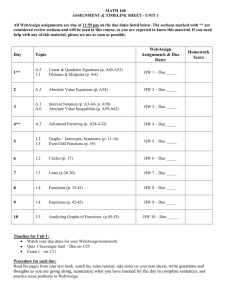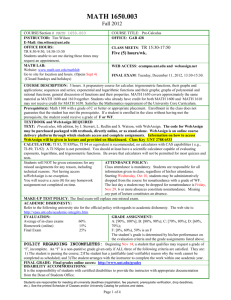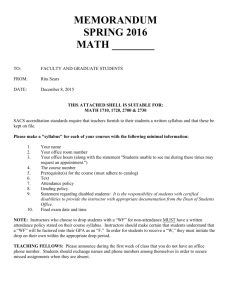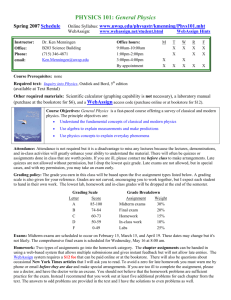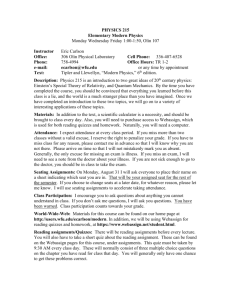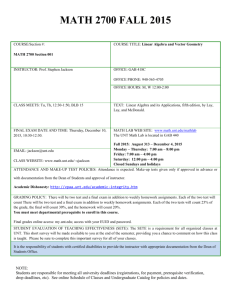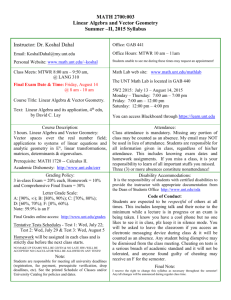MATH 1650.XXX - Department of Mathematics
advertisement
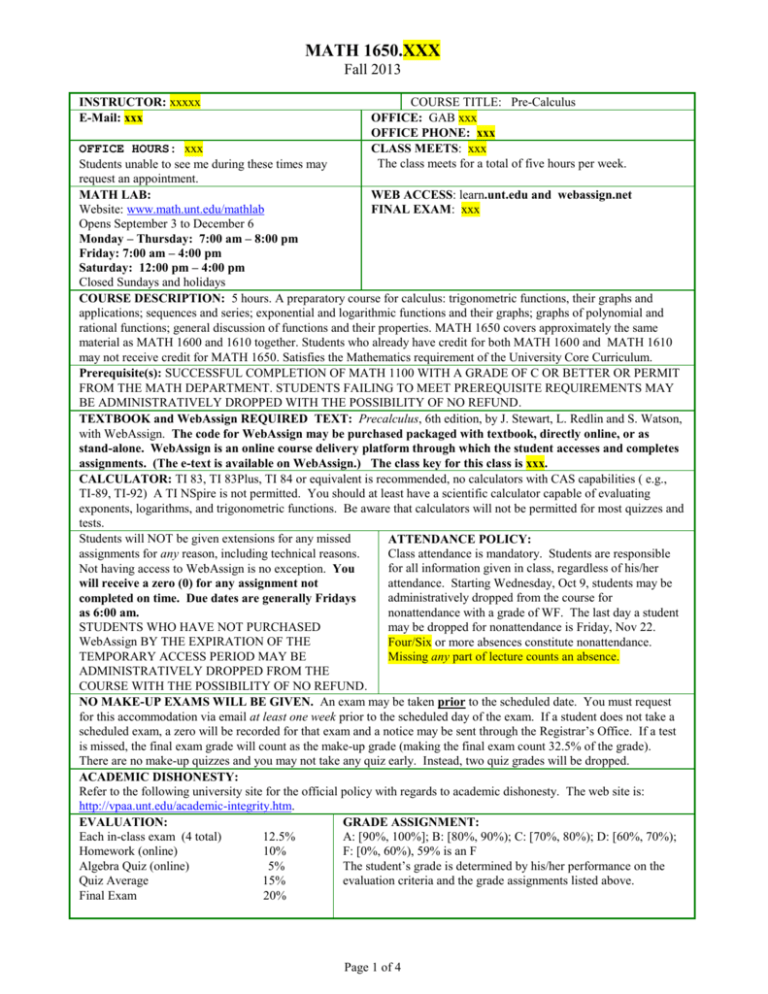
MATH 1650.XXX Fall 2013 INSTRUCTOR: xxxxx E-Mail: xxx COURSE TITLE: Pre-Calculus OFFICE: GAB xxx OFFICE PHONE: xxx CLASS MEETS: xxx The class meets for a total of five hours per week. OFFICE HOURS: xxx Students unable to see me during these times may request an appointment. MATH LAB: WEB ACCESS: learn.unt.edu and webassign.net Website: www.math.unt.edu/mathlab FINAL EXAM: xxx Opens September 3 to December 6 Monday – Thursday: 7:00 am – 8:00 pm Friday: 7:00 am – 4:00 pm Saturday: 12:00 pm – 4:00 pm Closed Sundays and holidays COURSE DESCRIPTION: 5 hours. A preparatory course for calculus: trigonometric functions, their graphs and applications; sequences and series; exponential and logarithmic functions and their graphs; graphs of polynomial and rational functions; general discussion of functions and their properties. MATH 1650 covers approximately the same material as MATH 1600 and 1610 together. Students who already have credit for both MATH 1600 and MATH 1610 may not receive credit for MATH 1650. Satisfies the Mathematics requirement of the University Core Curriculum. Prerequisite(s): SUCCESSFUL COMPLETION OF MATH 1100 WITH A GRADE OF C OR BETTER OR PERMIT FROM THE MATH DEPARTMENT. STUDENTS FAILING TO MEET PREREQUISITE REQUIREMENTS MAY BE ADMINISTRATIVELY DROPPED WITH THE POSSIBILITY OF NO REFUND. TEXTBOOK and WebAssign REQUIRED TEXT: Precalculus, 6th edition, by J. Stewart, L. Redlin and S. Watson, with WebAssign. The code for WebAssign may be purchased packaged with textbook, directly online, or as stand-alone. WebAssign is an online course delivery platform through which the student accesses and completes assignments. (The e-text is available on WebAssign.) The class key for this class is xxx. CALCULATOR: TI 83, TI 83Plus, TI 84 or equivalent is recommended, no calculators with CAS capabilities ( e.g., TI-89, TI-92) A TI NSpire is not permitted. You should at least have a scientific calculator capable of evaluating exponents, logarithms, and trigonometric functions. Be aware that calculators will not be permitted for most quizzes and tests. Students will NOT be given extensions for any missed ATTENDANCE POLICY: Class attendance is mandatory. Students are responsible assignments for any reason, including technical reasons. for all information given in class, regardless of his/her Not having access to WebAssign is no exception. You attendance. Starting Wednesday, Oct 9, students may be will receive a zero (0) for any assignment not administratively dropped from the course for completed on time. Due dates are generally Fridays nonattendance with a grade of WF. The last day a student as 6:00 am. STUDENTS WHO HAVE NOT PURCHASED may be dropped for nonattendance is Friday, Nov 22. WebAssign BY THE EXPIRATION OF THE Four/Six or more absences constitute nonattendance. TEMPORARY ACCESS PERIOD MAY BE Missing any part of lecture counts an absence. ADMINISTRATIVELY DROPPED FROM THE COURSE WITH THE POSSIBILITY OF NO REFUND. NO MAKE-UP EXAMS WILL BE GIVEN. An exam may be taken prior to the scheduled date. You must request for this accommodation via email at least one week prior to the scheduled day of the exam. If a student does not take a scheduled exam, a zero will be recorded for that exam and a notice may be sent through the Registrar’s Office. If a test is missed, the final exam grade will count as the make-up grade (making the final exam count 32.5% of the grade). There are no make-up quizzes and you may not take any quiz early. Instead, two quiz grades will be dropped. ACADEMIC DISHONESTY: Refer to the following university site for the official policy with regards to academic dishonesty. The web site is: http://vpaa.unt.edu/academic-integrity.htm. EVALUATION: GRADE ASSIGNMENT: Each in-class exam (4 total) 12.5% A: [90%, 100%]; B: [80%, 90%); C: [70%, 80%); D: [60%, 70%); Homework (online) 10% F: [0%, 60%), 59% is an F Algebra Quiz (online) 5% The student’s grade is determined by his/her performance on the Quiz Average 15% evaluation criteria and the grade assignments listed above. Final Exam 20% Page 1 of 4 POLICY REGARDING INCOMPLETES: Beginning Nov 13, a student that qualifies may request a grade of “I”, incomplete. An “I” is a non-punitive grade given only if ALL three of the following criteria are satisfied. They are: 1) The student is passing the course; 2)The student has a justifiable (and verifiable) reason why the work cannot be completed as scheduled; and 3)The student arranges with the instructor to complete the work within one academic year. FINAL GRADE: Final grades online access: http://www.unt.edu/grades DISABILITY ACCOMMODATIONS: The University of North Texas makes reasonable academic accommodation for students with disabilities. Students seeking accommodation must first register with the Office of Disability Accommodation (ODA) to verify their eligibility. If a disability is verified, the ODA will provide you with an accommodation letter to be delivered to faculty to begin a private discussion regarding your specific needs in a course. You may request accommodations at any time, however, ODA notices of accommodation should be provided as early as possible in the semester to avoid any delay in implementation. Note that students must obtain a new letter of accommodation for every semester and must meet with each faculty member prior to implementation in each class. For additional information see the Office of Disability Accommodation website at http://www.unt.edu/oda. You may also contact them by phone at 940.565.4323. It is the responsibility of students with certified disabilities to provide the instructor with appropriate documentation from the Dean of Students Office. Students are responsible for meeting all university deadlines (registration, fee payment, prerequisite verification, drop deadlines, etc.). See the printed Schedule of Classes and/or University Catalog for policies and dates. Test Dates (subject to change) Test 1: xx Test 2: xx Test 3: xx Test 4: xx Final Exam: xx Student Evaluation of Teaching Effectiveness: The SETE is a requirement for all organized classes at UNT. This short survey will be made available to you at the end of the semester, providing you a chance to comment on how this class is taught. Please be sure to complete this important survey for all of your classes. Student Behavior: Student behavior that interferes with an instructor’s ability to conduct a class or other students' opportunity to learn is unacceptable and disruptive and will not be tolerated in any instructional forum at UNT. Students engaging in unacceptable behavior will be directed to leave the classroom and the instructor may refer the student to the Center for Student Rights and Responsibilities to consider whether the student's conduct violated the Code of Student Conduct. The university's expectations for student conduct apply to all instructional forums, including university and electronic classroom, labs, discussion groups, field trips, etc. The Code of Student Conduct can be found at www.unt.edu/csrr. Academic Dishonesty: Cheating on final exams, on in-class tests, or on quizzes is a serious breach of academic standards and will be punished severely and generally result in a student failing the course. All work done on in-class exams and quizzes must represent only the student’s own work, unless otherwise stated in the directions. See http://vpaa.unt.edu/academic-integrity.htm for details on academic integrity at UNT. Attendance: Class attendance is mandatory. Missing any portion of class may be counted as an absence. My email may NOT be used in lieu of attendance. Students are responsible for all information given in class, regardless of his/her attendance. This includes knowing exam dates and homework assignments. If you miss a class, it is your responsibility to learn of all the important stuff you missed. Exchange contact information with several members of your class; so that you will have multiple sources contact in case of a personal emergency. Classroom Etiquette: Appropriate behavior is expected of all students taking this course. Arrive to class promptly and do not leave until the scheduled ending time of the class. If you must arrive late or leave early, please do so as discreetly as possible and take a seat near the door. Turn off all non-medical electronic devices such as pagers, cell phones, laptops, etc. Page 2 of 4 Take off the headphones. Do not read newspaper or work on unrelated assignments during class. I prefer that you not eat during class. You will be asked to leave the classroom if you access an electronic messaging device during class. Course Requirements: As a general rule, average college students are expected to spend a minimum of two (2) hours per week for each one (1) hour of class working on the course to be able to successfully learn the content. If you are an “average” collegelevel learner, you should spend at least six (6) hours per week if you expect to successfully complete this course. Adjust for more (or less) hours to accommodate your learning level. Drop Policy: If the student is unable to complete this course, it is his/her responsibility to formally withdraw from the course. The student may do so through the Registrar’s Office after obtaining the necessary signatures. Consents for withdrawal and all necessary signatures may be obtained in the Math Department Office, GAB 435. The last day to drop a class with an automatic “W” is October 8. The last day to drop a class with “W” or “WF” is November 6. “WF” is averaged into your GPA as an “F.” If the student does not properly withdraw from the course but stops attending, s/he will receive a WF or performance grade, usually an F. Exam Etiquette: Place all papers, textbook, notes, etc. in a backpack or a book bag and close it securely. Turn off all electronic devices (unless medically necessary), this includes cell phones, pagers, etc. Handling of ANY such electronic devices during an exam will be construed as cheating (receiving unauthorized aid) and may result in a zero for that exam. Do not wear HATS or CAPS during exams. Do not share any materials during an exam. This includes, but is not limited to pencils, erasers, calculators, etc. Have only the exam, pencil, eraser and calculator out during an exam. Plenty of work–space is provided on the actual exam. You will not be permitted to have any scratch paper during an exam. Final Exam The final exam is xxx. The final exam is comprehensive and is 20% of the course grade. Grade Assignment The student course grade is assigned according to the evaluation criteria and grading assignment stated on this syllabus. The grade is completely objective and is determined solely by student performance on each of the evaluation criteria (in-class exam grades, on-line homework and quizzes, and the final exam). Do not expect extra credit work or bonus grade assignments. Homework WebAssign online homework assignments for the entire term are already set; due dates and times are explicitly stated in WebAssign. You have five (5) attempts per problem-type for each online problem in WebAssign. NO LATE HOMEWORK will be accepted for any reason whatsoever. A grade of zero will be assigned to any homework assignment not completed online and submitted by the due date and time. Specifically, due dates will NOT be extended for any reason. NO EXCEPTIONS. If you are prone to circumstances that affect your ability to complete assignments as due, work ahead. Technical difficulty, including loss of internet access, is not an excuse for not completing assigned work. Incomplete, the Grade of Beginning November 13, a student that qualifies may request a grade of “I”, incomplete. An “I” is a non-punitive grade given only if ALL three of the following criteria are satisfied. They are: 1) The student is passing the course; 2) The student has a justifiable (and verifiable) reason why the work cannot be completed as scheduled; and 3) The student arranges with the instructor to complete the work within one academic year. Finality of Grades You have until one week after the exams and quizzes are returned to the class to bring to my attention issues regarding exam or quiz grades. After this time, the recorded grades are considered final. Regarding grades for Page 3 of 4 online homework and the Algebra Quiz, you have until 6:00 p.m. on Friday, December 6 to bring these issues to my attention (you can do so by e-mail). After this deadline, the recorded grades are considered final. This includes disputed results on WebAssign problems, disputed results on tests and quizzes, miscalculated grades for tests and quizzes, and mis-recorded grades on tests and quizzes. Progress Reports Students needing progress reports completed/signed for athletics, scholarships and/or any other organization must attend office hours to get them completed. I will not fill out progress reports before or after class. Recommended Keys to Success/Expectations Students who are successful in math spend a great deal of time and honest effort outside of class along with punctual attendance. Students who are successful come to each class on time and stay the entire class. You are responsible for everything that happens in class. You should come to each lecture and come prepared. Students who are successful spend an hour (or two) after each lecture with a classmate reviewing the lesson and working on homework problems. They meet with a study group several times per week and use the UNT Math Tutor Lab. Successful students work on the assignments consistently every day, instead of waiting until the last minute. They read their textbooks regularly and make learning notes. The UNT Learning Center has many resources to help you, both study skills and free tutoring. You can find their webpage at www.unt.edu/lc . For online tutoring, go to the webpage and select the online tutoring button located in the left column of the page. The UNT Learning Center offers an online tutoring system using the AskOnline platform. Math is not a spectator sport. You will not learn mathematics from watching the instructor or friends display ideas and solve problems. You must try the problems, finish problems, ask questions, correct your mistakes, put concepts in your own words, and practice, practice, practice!! An increase in effort usually results in increases in success. Students enrolling in higher education for the first time during the Fall 2007 academic term or any term subsequent to the Fall 2007 term may drop a total of six courses. This total includes any course a transfer student has dropped at another Texas public institution of higher education. This does not apply to courses dropped prior to the census date or courses dropped with a grade of WF and does not apply if the student withdraws for the term or session. Certain exceptions may be made to the limit if the student can show good cause for dropping more than that number. UNT Mathematics Core Component After completing Math 1650, students will have learned: 1. to apply arithmetic, algebraic, geometric, higher-order thinking, and statistical methods to modeling and solving real-world situations; 2. to represent and evaluate basic mathematical information verbally, numerically, graphically, and symbolically; 3. to use appropriate technology to enhance mathematical thinking and understanding and to solve mathematical problems and judge the reasonableness of the results; and 4. to interpret mathematical models such as formulas, graphs, tables and schematics, and draw inferences from them. While taking Math 1650, students will participate in the following over-arching objectives of UNT’s core curriculum. Math 1650 students will: • explore math • make connections between different areas of knowledge and different ways of knowing • be able to locate, evaluate and organize information including the use of information technologies • think critically and creatively, learning to apply different systems of analysis • develop problem solving skills • cultivate self-responsibility, building a foundation for life-long learning Page 4 of 4

